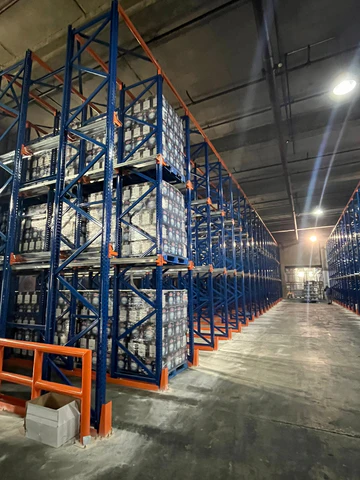Celebrating 65 years of Ayoubi Steel!
Advantages and Disadvantages of Drive-In Pallet Racking

Drive-in pallet racking allows a forklift truck to enter the rack from one side to pick up or pull out the pallets. Forklifts drive into the rack two or more deep. The depth of storage for a particular bay is limited by the size of the facility.
Drive-in racks offer the ability to store a large amount of similar loads in a smaller area. Selectivity is sacrificed but the storage density is outstanding. Drive in racking can store up to 75% more pallets for the same space of selective conventional racking.
Drive-in racks can be single entry where the lift truck can only pick up pallets from one side. This allows only for Last-In-First-Out (LIFO) operation. In a double entry drive-in rack (which is also called Drive Through Racking), lift trucks can pick up the pallets from two sides which allows for First-In-First-Out (FIFO) operation. However double entry drive-in rack requires more space than single-entry drive-in racks.
Advantages of Drive-In Racking
- Allows for higher density storage if space is limited (e.g. cold rooms or freezers)
- Can store up to 75% more pallets for the same space as selective conventional racking
- Works for low turnover similar Stock Keeping Unit (SKUs)
Disadvantages of Drive-In Racking
- Access to pallets is reduced due to the nature of storing the pallets in drive-in racking
- Forklift damage is potentially higher because of the tight spacing available. This can be avoided using a guide rail.
- Drive-in racks are susceptible to honeycombing which is when the operator fails to deposit the load at the back of the racking system thus creating un-utilized storage space.
For inquiries and to request a free quotation, please visit the contact us form page by clicking on the below button:
